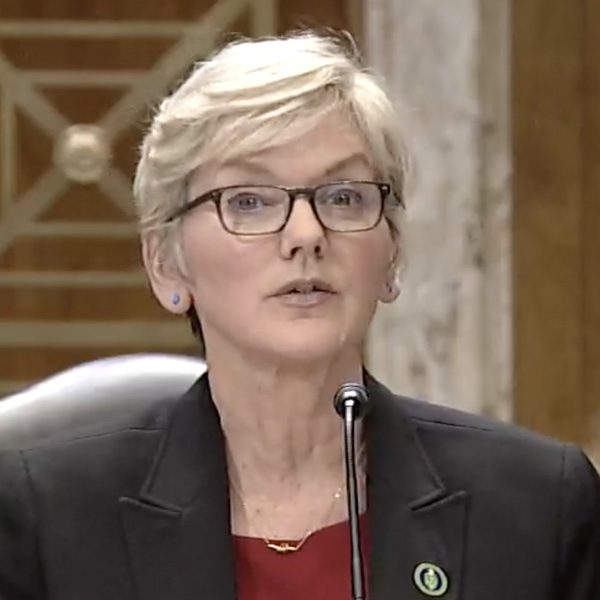
U.S. Energy Secretary Jennifer Granholm on April 16 defended her department’s $51 billion budget proposal for fiscal 2025 before hostile Republicans on the Senate Energy and Natural Resources Committee.
Granholm said companies have announced 600 new or expanded clean energy manufacturing sites in the country and nearly $200 billion in investment in the sector since the Infrastructure Investment and Jobs Act passed.
“Our commercialization tools are giving American businesses the confidence that they need to capitalize on this moment while deepening our energy security,” Granholm said. “But deepening our energy security is an ongoing project, and we need to fund it year over year, and that’s why the budget calls for significant appropriations for our demonstration and deployment programs.”
While Granholm said DOE’s efforts were leading to reindustrialization and new jobs, Republicans — led by Ranking Member John Barrasso (R-Wyo.) — tried to hang their worries about the cost of living on the Biden administration’s energy policies.
“Prices are not only worse under Biden, they are significantly worse: gasoline up 48%, natural gas up 27%, home heating oil up 44%, electricity up 29%, total energy costs of 39%,” Barrasso said as a staffer held up a chart with those numbers. “Since Joe Biden has come into office, this is a record failure.”
Sen. Bill Cassidy (R-La.) said later in the hearing that the same numbers show how the administration has not been successful in cutting costs for consumers.
Granholm noted that the chart was comparing current prices to those at the height of the COVID-19 pandemic, when prices were depressed because of its impact on the economy.
“Natural gas is at very low prices,” Granholm said. “Right now, the price of solar is very low. What’s causing the increase in energy prices? One contributing factor is the investments in the grid that are necessary, this old grid that gets ratebased among ratepayers. And it’s one of the reasons why it’s so important for us all in leadership to take a look at how we invest in the national electric grid, so that we are not forcing ratepayers to bear that burden.”
Cassidy also argued that the lack of pipeline development had been hindered by Biden administration policies.
DOE does not oversee pipeline siting, but Granholm noted that the budget request includes funding for the Low Income Home Energy Assistance Program for weatherization and other efficiency investments to help lower bills for customers.
Sen. Steve Daines (R-N.D.) asked when DOE expected to complete the study for which the administration has paused all new LNG export facility approvals.
“I look no further than the White House website where the first quote in their press release lauds — and let me quote — ‘this administration’s historic efforts to meet the global commitment to phase out fossil fuels,’” Daines said.
Granholm said she had not seen the White House’s press release but noted that the industry has grown since the last time the impacts of LNG exports were studied.
“We were only exporting 4 BCF of LNG at that time, and now we are exporting 14 with another 12 BCF under construction, and 48 total authorized,” Granholm said. “This pause doesn’t affect any of that.”
DOE expects to finish the study around the end of the year, and Granholm said staff working on it have been focused on how exports will impact domestic prices and what the future demand will be for LNG, especially given that many of the countries buying it today have their own commitments to net zero.
Sen. Angus King (I-Maine) was more supportive of the pause, noting it was prudent to examine exports’ impacts given how quickly they have grown.
“Our low domestic gas prices are a huge asymmetric advantage around the world,” King said. “And I’m concerned that we will, in effect, export that advantage.”


